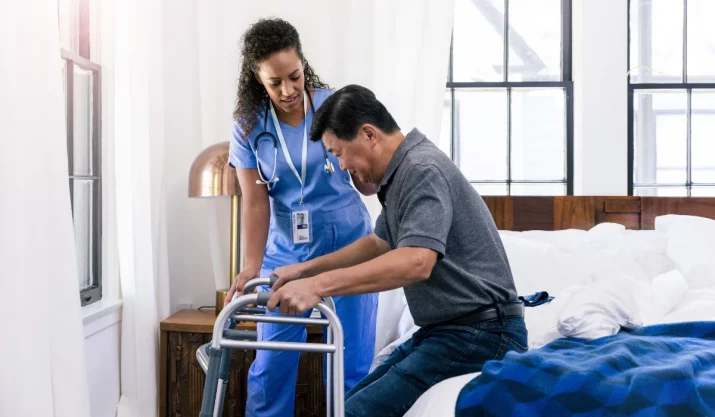10 Important Questions to Ask During a Senior Health Checkup

Table of Contents
- Key Takeaways
- 1. What screenings or tests are recommended for someone my age?
- 2. Are my current medications still appropriate?
- 3. What changes should I make to my lifestyle to improve my health?
- 4. Are there any vaccinations I should consider?
- 5. Can we review my advance directives?
- 6. What symptoms should I be mindful of as I age?
- 7. Is there anything specific that I should address with a specialist?
- 8. How can I manage chronic conditions better?
- 9. What changes in my mental health should I look out for?
- 10. Are there community resources or support groups you recommend?
Almost all seniors over 60 face health issues — in fact, 95% have at least one, and 80% have two or more. But what should you ask at your health checkup? This article offers ten important questions to ask your physician during your annual exam.
These questions are designed to help older adults better understand and manage their health needs.
Key Takeaways
- Schedule regular health checks and medication reviews, and ask your healthcare provider about recommended screening tests to stay on top of your health.
- Make lifestyle changes and keep up with preventive care, including vaccinations, to enhance your well-being as you age.
- Review and update your advance directives often, and stay alert to any new physical and mental symptoms for timely care.
- Seek out and engage with community resources and support groups for additional support and guidance in managing health and aging.
A personal health journal can be a game-changer for seniors looking to get the most out of their health checkups. It empowers them to be proactive and prepared by keeping all their health information organized in one place.
Michaela Ramirez, MD, Founder, Laya Health
1. What screenings or tests are recommended for someone my age?
Screenings and tests are crucial for the early detection of health issues. Your primary care provider’s recommendations vary based on age, gender, and health history. Essential health screenings may include:
- Blood pressure checks
- Cholesterol tests
- Mammograms
- Colonoscopies
- Bone mineral density (BMD) tests
- Other cancer screening tests (e.g., cervical cancer, or other cancers based on your family history)
- Blood tests
Asking about these screening tests helps you stay proactive in maintaining your health and well-being. Regular wellness visits and annual physicals can help immensely in this regard.
2. Are my current medications still appropriate?
It’s good to see if your medicines are still the best ones for you. On your next doctor’s visit, discuss all your medications, including those you buy without a prescription. This helps your doctor ensure your medications all work well together and are safe for you. They might change how much you take, try new ones, or stop some.
Talking about your medicines also helps you know more about risk factors and how to deal with possible side effects.
3. What changes should I make to my lifestyle to improve my health?
Your lifestyle greatly affects your health and well-being. Discussing your habits with your healthcare provider can lead to beneficial changes. Consider these key areas:
- Diet: Focus on nutritious, balanced meals, vitamins, and supplements to support overall health.
- Physical Activity: Increasing exercise can improve heart health and more. So can improving your mobility.
- Alcohol Intake: Moderate consumption to reduce health risks.
- Smoking: Quitting smoking significantly lowers the risk of many diseases.
Making positive lifestyle changes not only helps prevent conditions like heart disease and type 2 diabetes but also boosts your overall quality of life.
4. Are there any vaccinations I should consider?
Your immune system may weaken as you age, so staying updated with vaccines is crucial. Discuss which vaccinations are right for you with your healthcare provider. Key vaccines to consider include:
- Flu vaccine
- Pneumonia vaccine
- Shingles vaccine
Staying current with these vaccinations can shield you from preventable diseases and support your overall health.
5. Can we review my advance directives?
An advance directive is an important paper that tells doctors what to do if you get too sick to make your own decisions. It’s a good idea to review this with your doctor to ensure it says what you want. There are two main parts:
- Living Will: This part says what kind of medical care you want (or don’t want) if you’re very sick and can’t talk for yourself.
- Power of Attorney for Healthcare: This names someone you trust to make health decisions for you if you can’t.
Checking these documents regularly helps ensure they match your current health needs and wishes. Talking about this with your doctor can also clear up any questions or worries you have about the choices made for you.
6. What symptoms should I be mindful of as I age?
As your body changes with age, awareness of new or worsening symptoms is vital for your health. Discuss specific signs to watch for with your healthcare provider based on your personal and family history. Key symptoms include:
- Weight Changes: Sudden loss or gain could indicate underlying issues.
- Blood Pressure Fluctuations: Persistent high or low readings need attention.
- Vision or Hearing Changes: Alterations in vision or hearing could signal health problems.
- Mental Health: Watch for signs of depression or anxiety.
Being mindful of these symptoms allows for timely medical care and effective health management.
7. Is there anything specific that I should address with a specialist?
Sometimes, your regular healthcare provider might think you need to see a special doctor for certain medical conditions. For example, a heart doctor (cardiologist) for heart issues, an arthritis doctor (rheumatologist), or a diabetes doctor (endocrinologist).
It’s good to ask if you need to see one of these doctors. This helps ensure you get the proper care quickly and in the best way for any health problems.
8. How can I manage chronic conditions better?
In your health checkup, ask how to better manage chronic conditions like heart disease or diabetes. This conversation is critical for personalized care. Consider discussing:
- Treatment Plans: Confirm you’re clear on your healthcare provider’s advice and stick to it.
- Symptom Monitoring: Be vigilant about changes in health conditions and report them for appropriate care adjustments.
- Lifestyle Changes: Ask about dietary changes and exercises that could help manage your condition.
- Expert Guidance: Request specific strategies or resources from your healthcare provider.
9. What changes in my mental health should I look out for?
Like your body, your mind’s health matters greatly, especially when you get older. You might feel changes in your mood or find it harder to remember things or think clearly.
Common issues for older people can be feeling sad (depression), worried (anxiety), or alone (loneliness), or having trouble thinking (cognitive impairment). If you notice any changes like these, you should tell your healthcare provider. They can help you find the right help and suggest ways to deal with these changes., you must tell your doctor. They can help you find the right help and ways to deal with these changes.
10. Are there community resources or support groups you recommend?
Community resources and support groups can be a lifeline. They offer social interaction and practical guidance in managing your health and well-being. Here are three sources to consider:
- AARP Community Connections: A platform for finding local groups and virtual community support.
- Eldercare Locator: A public service for finding assistance with healthcare navigation and local eldercare services.
- SilverSneakers: Offers fitness programs tailored for seniors, promoting physical activity and social interaction.
Discuss these options with your healthcare provider to find the best fit for your needs and enhance your journey in health and aging.






